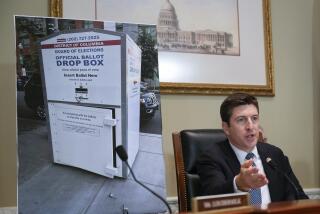Senate Votes to Bar Counting of Illegal Aliens in Census
WASHINGTON — In a blow to California and other states with large immigrant populations, the Senate voted Friday to bar the Census Bureau from counting illegal aliens in the 1990 population count.
The action came on a voice vote, despite arguments from the Bush Administration and other opponents that it is both unconstitutional and unworkable. Just before the voice vote, the senators voted, 50 to 41, against killing the proposal to bar aliens from the count.
A Senate-House conference committee will decide whether the prohibition against including illegal immigrants in the census totals will be retained or dropped from a $17.4-billion appropriations bill for the State, Justice and Commerce departments.
Even if the prohibition survives, Secretary of Commerce Robert A. Mosbacher has said that he would ask President Bush to veto any bill that comes to his desk with such a provision.
At stake are the number of seats in Congress for California, Florida, New York, Illinois, Pennsylvania and other states that will be reapportioned on the basis of next year’s census.
Federal aid to states also is frequently based on population counts, so millions of dollars in grants and other funds made available on a per capita basis would be affected.
The issue cuts across partisan lines in the Senate, with Minority Leader Bob Dole (R-Kan.) arguing against the White House position on grounds that including illegal aliens in the census is unfair to American citizens.
Loss of Seats Cited
“Some states will lose congressional seats because of illegal aliens,” Dole argued. Sen. Thad Cochran (R-Miss.) said that Georgia and Indiana both lost House seats after the 1980 Census, and California and New York--centers of illegal immigration--each gained seats.
“The bottom line is illegal aliens ought to be deported, not counted,” Cochran said.
Sen. Pete Wilson (R-Calif.) countered that excluding illegal residents from the decennial census is unfair to the states that have suffered from a huge influx of immigration beyond the legal limits.
“There are enormous additional costs for states who have had a surge of population,” Wilson said, adding that those states should receive additional federal aid to cope with the added problems.
Opponents of a ban on counting illegal aliens said that a ban is impractical because the Census Bureau already has printed questionnaires that do not contain any question about legality of residence.
For 190 years, said Sen. Daniel Patrick Moynihan (D-N.Y.), the federal government has counted all inhabitants without regard to citizenship in accordance with the Constitution’s provisions. “Fiddling with the numbers” now will destroy confidence in the census results, he added.
The Senate’s action was sharply criticized by Undersecretary of Commerce Michael Darby, but he voiced hope that it would be reversed by a Senate-House conference.
“There really is a widespread realization that this would not only be unconstitutional but literally impossible,” Darby said.
But he added that he is “optimistic, cautiously optimistic,” that House conferees would resist the Senate-approved ban and not force Bush to veto the legislation.
Mario Moreno, head of the Mexican American Legal Defense Fund, said he was shocked by the Senate’s decision. “It is going to have a dramatic and disastrous impact in the Hispanic community,” Moreno said. “People are going to be discouraged from participating.”
A Census Bureau spokesman took a more dispassionate view, however.
“Our position is that we count everybody at their place of residence,” said bureau spokesman James Gorman. “If Congress passes a law that says we will or will not count people, we will do what it says.”
More to Read
Get the L.A. Times Politics newsletter
Deeply reported insights into legislation, politics and policy from Sacramento, Washington and beyond. In your inbox three times per week.
You may occasionally receive promotional content from the Los Angeles Times.










